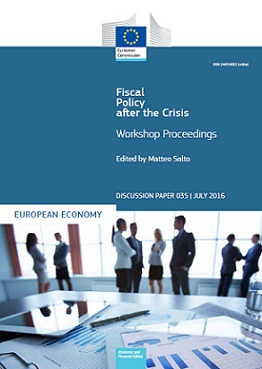Gaspar, Vitor, Escolano, Julio, (2016), “An Argument for Paying Down Public Debt”, iMFdirect, 26 Αugust What should governments do about high public debt-to-GDP ratios? This question is getting much-deserved attention. Let’s abstract from macroeconomic (business cycle) considerations and look at the issue purely from an optimal tax smoothing perspective—that is, weighing the cost and benefits of raising taxes to pay down debt. By doing so we decidedly do not engage in …Read More
Transition To Transfers: Options For EMU Level Unemployment Insurance
Andor, László, (2016), “Transition To Transfers: Options For EMU Level Unemployment Insurance”, Social Europe, 29 Αugust In his new book on the euro, Joseph Stiglitz mentions unemployment insurance as part of a reform program that could make monetary union sustainable and palatable in Europe. The idea is not entirely new, and recent years have seen a good deal of studies and conferences exploring its costs and benefits. In documents like the …Read More
How can we explain the persistence of the Great Recession? A balanced stability approach
Togati, Teodoro Dario, (2015), “How can we explain the persistence of the Great Recession? A balanced stability approach”, Cambridge Journal of Economics, September The Great Recession (GR) creates a stalemate in macroeconomics. On the one hand, standard approaches fail to account for its persistence in a credible way due to their implicit assumption that the economy is internally stable. On the other, heterodox approaches fail to regain consensus. While often correctly …Read More
Absolute Advantage and International Trade – Evidence from Four Euro-zone Economies
Seretis, Stergios A., Tsaliki, Persefoni V., (2016), “Absolute Advantage and International Trade – Evidence from Four Euro-zone Economies”, Review of Radical Political Economics, Αugust The purpose of this paper is to give empirical content to the approach of international trade based on the principle of absolute advantage and to show that differences in productivity may give rise to transfers of value towards the units of capital with an absolute advantage in production. Our …Read More
Demystifying Monetary Finance
Turner, Adair, (2016), “Demystifying Monetary Finance”, Social Europe, 23 Αugust Eight years after the 2008 crisis governments and central banks – despite a plethora of policies and approaches – have failed to stimulate enough demand to produce sustained and strong growth. In Japan, so-called Abenomics promised 2% inflation by 2015; instead, the Bank of Japan (BOJ) expects it to be close to zero in 2016, with GDP growth below 1%. Eurozone …Read More
Labour market modelling in the light of the financial crisis
ECB, (2016), “Labour market modelling in the light of the financial crisis”, ECB, Occassional Paper Series No 175, Αugust This paper revisits the empirical relationship between unemployment and output, and its evolution following the financial crisis of 2008, with the aim of drawing potential consequences for labour market modelling strategies in place within the European System of Central Banks (ESCB). First, the negative correlation between output and unemployment (Okun’s law) at …Read More
Smoothing economic shocks in the Eurozone: The untapped potential of the financial union
Buti, Marco, Leandro, José, Nikolov, Plamen, (2016), “Smoothing economic shocks in the Eurozone: The untapped potential of the financial union”, Voxeu, 25 Αugust The fragmentation of financial systems along national borders was one of the main handicaps of the Eurozone both prior to and in the initial phase of the crisis, hindering the shock absorption capacity of individual member states. The EU has taken important steps towards the deeper integration of …Read More
The Political Economy of Debt and Entitlements
Bouton, Laurent, Lizzeri, Alessandro, Persico, Nicola, (2016), “The Political Economy of Debt and Entitlements”, CEPR, Αugust This paper presents a dynamic political-economic model of total government obligations. Its focus is on the interplay between debt and entitlements. In our model, both are tools by which temporarily powerful groups can extract resources from groups that will be powerful in the future: debt transfers resources across periods; entitlements directly target the future allocation …Read More
The Fed and Lehman Brothers
Ball, Laurence, (2016), “The Fed and Lehman Brothers”, Johns Hopkins University, July On Monday, September 15, 2008, at 1:45 AM, Lehman Brothers Holdings Inc. filed a bankruptcy petition in the United States Bankruptcy Court for the Southern District of New York. This action was the most dramatic event of the financial crisis of 2007-2009, and many economists believe it greatly worsened the crisis and the Great Recession that followed. Why …Read More
Fiscal Policy after the Crisis
Salto, Matteo, (2016), “Fiscal Policy after the Crisis”, European Commission, Discussion Paper 35, July This paper presents the proceedings of the annual Public Finance Workshop organised by the Directorate-General for Economic and Financial Affairs in Brussels on 19 January 2016 in relation with the publication of its Public Finance in EMU 2015 Report. After the double-dip recession between 2009 and 2013, growth is gradually returning to the EU and the euro area but it …Read More






